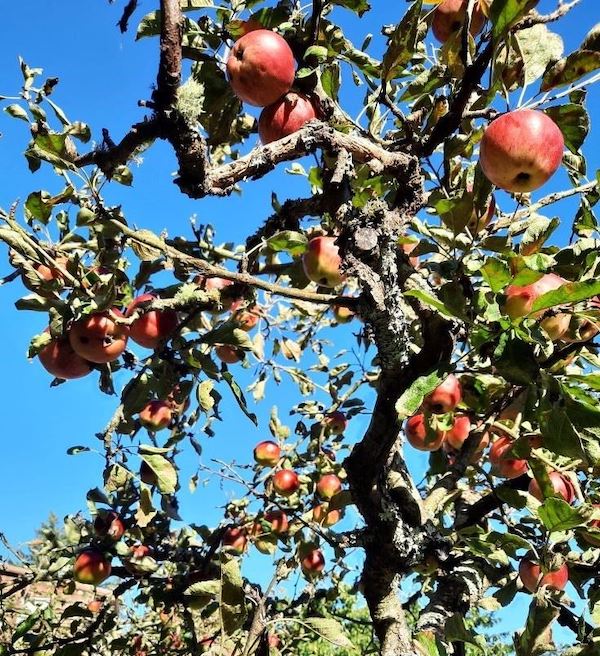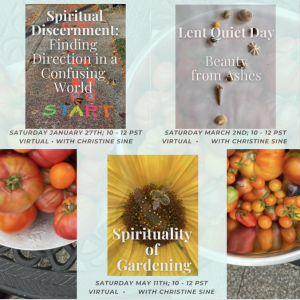“Here we come a-wassailing among the leaves so green;
Here we come a-wand’ring, so fair to be seen.”
Yes, this is the beginning of a familiar Christmas and New Year’s carol. While it might seem that I am writing out of season, I am actually not. The season of wassailing is still very much with those of us who live in the northern hemisphere.
The text and tradition behind this English carol, like many traditions in the British Isles, is an adaptation by the culture of a much older Celtic tradition. From the Old English language (Norse) wassail literally means “be whole” or “be in good health.” In former times, most notably in Cornwall and Wales, wassailing was a ceremony to give thanks for and to bless apple tree orchards.
In her book, Kindling the Celtic Spirit, Mara Freeman, writes,
“A wassail (punch) bowl was made from warm spiced ale or cider with roasted apples floating in it. Farmers took the bowl into the orchards and sang a toast to each tree. After drinking from the bowl, themselves, the rest was shared with the trees by pouring its contents over the tree’s roots. Wassailing was done to ensure a plentiful crop of the apples the following autumn.”
In the seventeenth century, during the Christmas season, the wassail bowl was carried with caroling not to the orchards but to the gates and doors of the gentry. After wassailing the inhabitants, the carolers were rewarded with a gratuity. Hence this verse from the current carol,
“God bless the master of this house/Likewise the mistress too,
And all the little children/That round the table go.”
As a lover of both Celtic and natural farming practices, I find it charming to have recently learned about the continuation of the custom of wassailing trees. It is still practiced today in some places. As I learned in an email from a friend of a friend,
“The blessing of the trees that bear fruits for humans, is a welcoming back of the trees for another season. Inherent in this welcoming back is the timing, just after the Winter Solstice and just before the growing season kicks into high gear. Generally, this ceremony is held between December 22 and February 1. This practice has taken place for hundreds of years (if not longer) and continues across the UK to this day.”
Here is a short video of a wassail song used at the Alexandra Food Forest near Glascow, Scotland. The local community gathers every year to hold this ceremony. This video was made during pandemic times as gatherings were not allowed. It functioned as an open invitation for individuals to continue the tradition on their own in this particular place.
Because my adult children are farmers, I suggested that we might hold such a welcoming ritual on the family farm. And interestingly, the lead farmer the very next day had received a message from a well-known seed company in Maine with the same invitation,
“For thousands of years, orchardists have been gathering on a deep dark January night to sing and dance, drink cider, and welcome in the New Year. Musicians play and we sing old wassail songs and chant to the trees. We pour cider on the roots. The wassail celebration is about getting together to express joy and thanks for making it through another year. We honor each other and honor the plants—particularly the apple trees—that sustain us. We exhort the trees to fend off disease and insects and drought and flood and whatever else comes their way. We express our excitement and anticipation to get back into the gardens and orchard, come spring.”
–Fedco website
In the Episcopal Church we bless humans at birth, baptism, marriage, times of illness and dying. We bless bread and wine, setting it aside as “holy gifts for holy people.” We bless objects for ritual use, homes, pets and animals. On Rogation Days, (I will write about that come spring) we bless church yards and gardens. It has been said that the church exists to be a community of blessing.
One of the most delightful aspects of the Celtic Christian tradition is to learn how they expanded the church’s blessings and covered the day and all of their activities with their own blessings and prayers. You can find many of these prayers that were part of the oral tradition of the Hebrides and Western Scotland, collected by Alexander Carmichael (1832-1912) in the Carmina Gadelica. John Phillip Newell notes that the most striking characteristic of Celtic spirituality is that these prayers are a celebration of the goodness of creation. (Listening for the Heartbeat of God, p. 41)
I was not raised with the notion that God could be experienced in and through creation. It has been a joyful journey to begin acknowledging and celebrating that creation is sacred. And with that comes my deep and abiding gratitude that other faith and “secular” communities, both ancient and contemporary, have and continue to join together to give thanks for the Earth and to bless creation.
Anytime we stop and give thanks for the good Earth that God has given us to steward, we expand our human capacity to love and serve God, one another, creation and ourselves. In these times of global climate change perhaps we are being called to partner with the Earth. We do this of course in our actions of being mindful in how we treat this “fragile Earth, our island home.” (Book of Common Prayer) But maybe we also make a difference to the Earth and to our own well-being through our prayers and thanksgivings for her goodness to us.
Next weekend, I will join my family and the farmers to join in a wassailing ritual at their ashram. It will follow the ancient custom of gathering with intention, making some noise with drums and sticks to ward off calamity and to move energy. We will sing to the trees and the children will help to pour cider on the tree’s roots. We will bless the trees and the land and be a blessing to one another even as we know we are blessed by God.
Perhaps you can create your own rituals of blessings for your gardens or for your favorite spots in creation. Perhaps you can write your own prayers and remember to give thanks for the Good Earth in all times and places. Or, feel free to use mine.
Eternal Spirit, Earth-maker,
we thank you for the beauty of trees,
for the joy of their fragrant flowers
and the many fruits they bear and share with us.
Eternal Spirit, Pain-bearer,
we pray for the healing
of the many parts of our beloved Earth
that carry wounds caused by human hands.
Eternal Spirit, Life-giver,
we bless you for the rhythms of the Earth
for the changing seasons and tides,
for the light of day and the stillness of night.
We bless you for the love you show us.
Help us to return that love to you
and all of your creation.
Amen. (EHB+)
NOTE: As an Amazon Associate I receive a small amount for purchases made through links above Thank you for supporting Godspacelight in this way.
It’s time to sign up for our upcoming retreat Spiritual Discernment: Finding Direction in a Confusing World. Christine Sine will facilitate an exploration of practices that enable us to become “all ears” and listen in all circumstances to the voice of God. This session will be full of helpful input, discussion and creativity. Come join us and learn to listen more deeply to the voice of God.
Sign up for all three upcoming retreats at a considerable discount.


